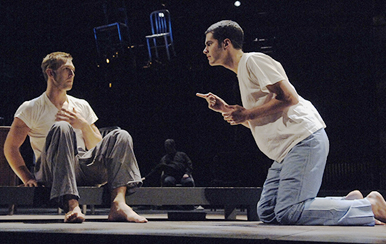Every good play deserves a full house
Fringe Festival continues with Every Good Boy Deserves Favour

Music students use the phrase “every good boy deserves favor” to remember the notes (EGBDF) that sit on the lines of the treble clef. In the case of Tom Stoppard’s Every Good Boy Deserves Favour, the words are a double entendre: one of the play’s characters is a full symphony orchestra, another is a father who must choose between his political principles and the life of his son.
“Stoppard is known for his intelligence and his wordsmithing,” says Jim Petosa, director of the College of Fine Arts school of theatre and director of the play, which is part of CFA’s Fringe Festival, a three-week-long arts extravaganza that started October 13 and runs through November 5.
Inspired by a meeting with Russian exile Victor Fainberg and based in part on the experiences of Soviet dissident Vladimir Bukovsky, the play tells the story of two inmates — one genuinely mentally ill and one a political prisoner — who share a name as well as a cell in a Leningrad asylum during the early 1970s. The prisoner, Alexander Ivanov, portrayed by Jason McDowell-Green (CFA’07), will not be released until he admits that his statements against the Soviet government were caused by schizophrenia, and in a cruel attempt to convince him to recant, threats are made against his young son, Sacha, played by David Rosenblatt (CFA’08). Meanwhile, Alexander’s disturbed cellmate, also named Ivanov and performed by Alex Mickiewicz (CFA’08), believes that he is the conductor of a symphony orchestra, which he imagines also shares the cell.
“Throughout the play, his son’s goodness requires Alexander to think outside of his own self-interest,” says Petosa. “If Sacha is a good boy who deserves a favor, his father is put into the divided position of being true to his own perspective or cooperating with the state in deference to the welfare of his son.”
Every Good Boy Deserves Favour, with music by André Previn and featuring Neal Hampton as guest conductor, is rarely performed because the play requires a full symphony orchestra in addition to the six actors. “It’s a very unusual piece,” Petosa says. “There’s a 47-member symphony orchestra that shares the stage with the actors. That far exceeds the standard pit orchestra for a musical.”
Petosa says he found the musical particularly appealing because it combines components of two CFA schools: actors from the school of theatre and an orchestra from the school of music. “This is the only play I know of where the orchestra itself is a character that lives inside the head of one of the actors,” he says. “The integration of drama and music is so complete. I think the presence of music gives it an incredible emotional accessibility, and I know the actors are finding the presence of the music to be absolutely inspiring.”
In addition to being one of this year’s Fringe Festival offerings, Every Good Boy Deserves Favour is part of the special exhibition Gulag: Soviet Forced Labor Camps and the Struggle for Freedom, which traces the history of the Soviet Union’s forced labor camp system and its impact on Russia and the world today. Boston University teamed up with the Boston National Historical Park to present the exhibition, which originally opened earlier this year on Ellis Island in New York and will be at the 808 Gallery from October 24 to January 14, 2007.
The Fringe Festival opened last weekend with Arthur Miller’s Playing for Time and continues though November 5. In addition to Every Good Boy Deserves Favour and Playing for Time, it features Jules Massenet’s La Navarraise, Jorge Martín’s Before Night Falls, and excerpts from Jin Xiang’s The Savage Land. All performances take place in Studio 210 of the Boston University Theatre, 264 Huntington Ave., except Every Good Boy Deserves Favour, which will be performed on the mainstage. Tickets are $7 for Studio 210 and $8 and $10 for mainstage; BU community members may receive one free ticket per BU ID, available at the door only and subject to availability.
For a full schedule of the various plays’ dates and times and to purchase tickets, go to www.bostontheatrescene.com, call 617-933-8600, or visit the Boston University Theatre box office.